Sir John Monash, Personal Files Book 2, 23 February - 31 March 1915, Part 5
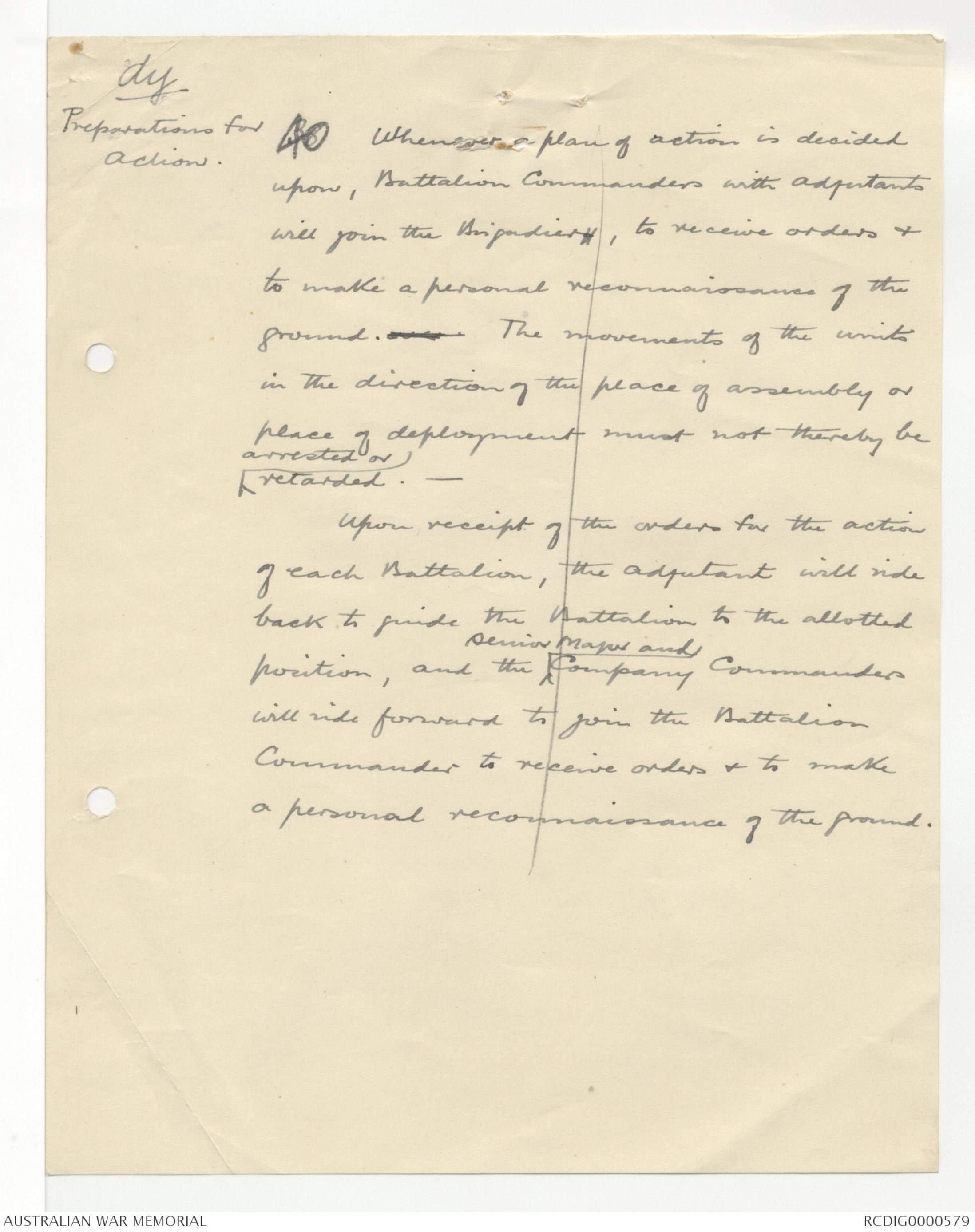
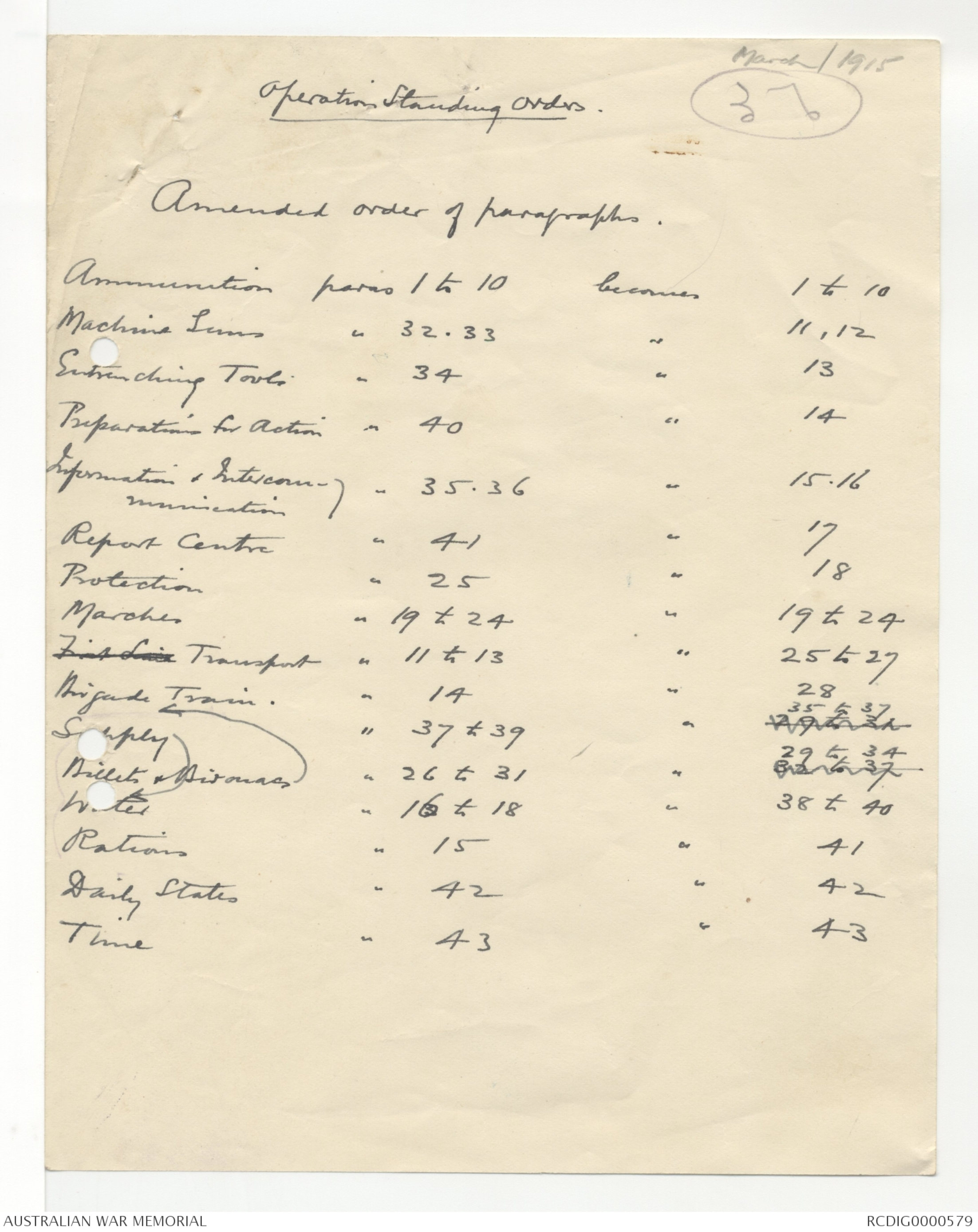
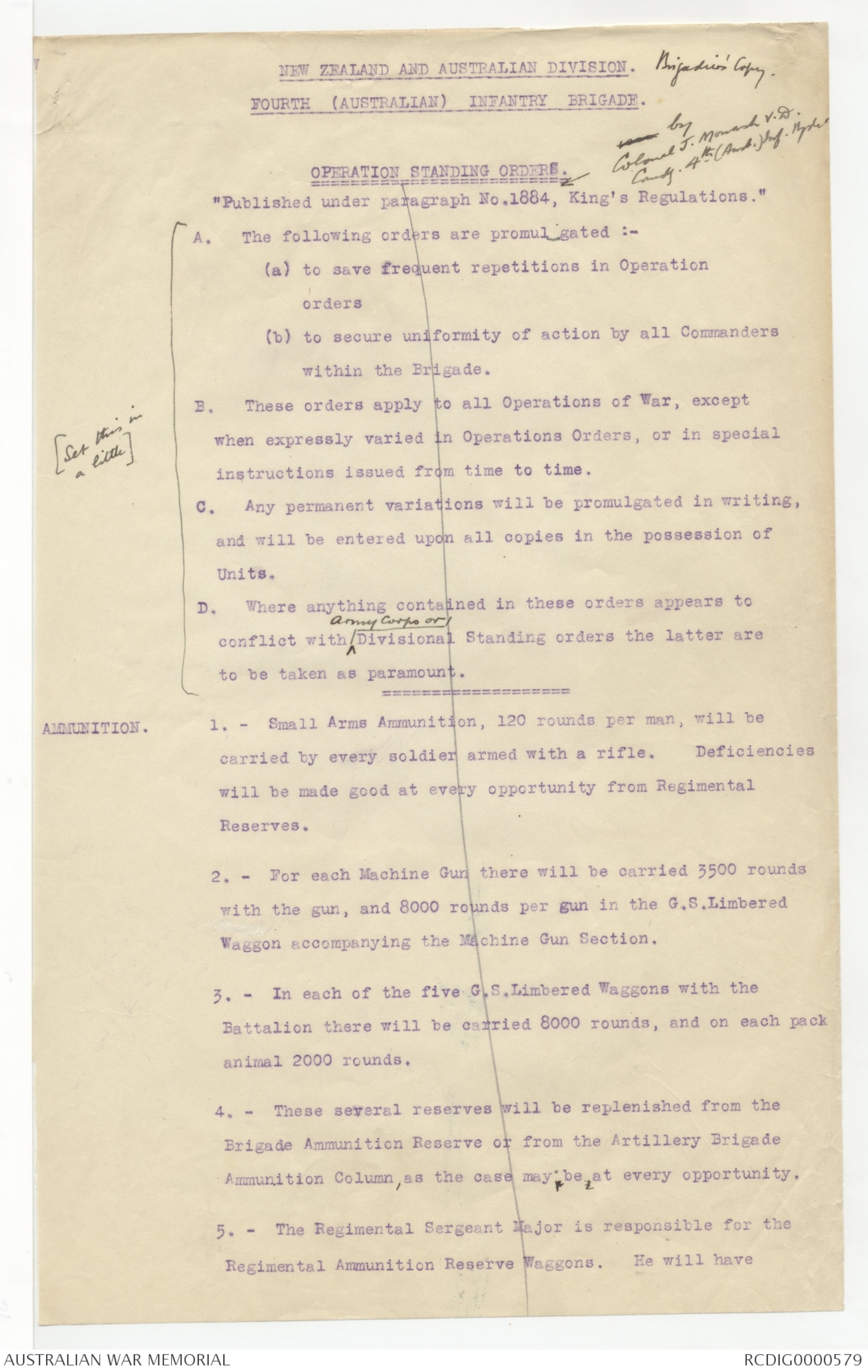
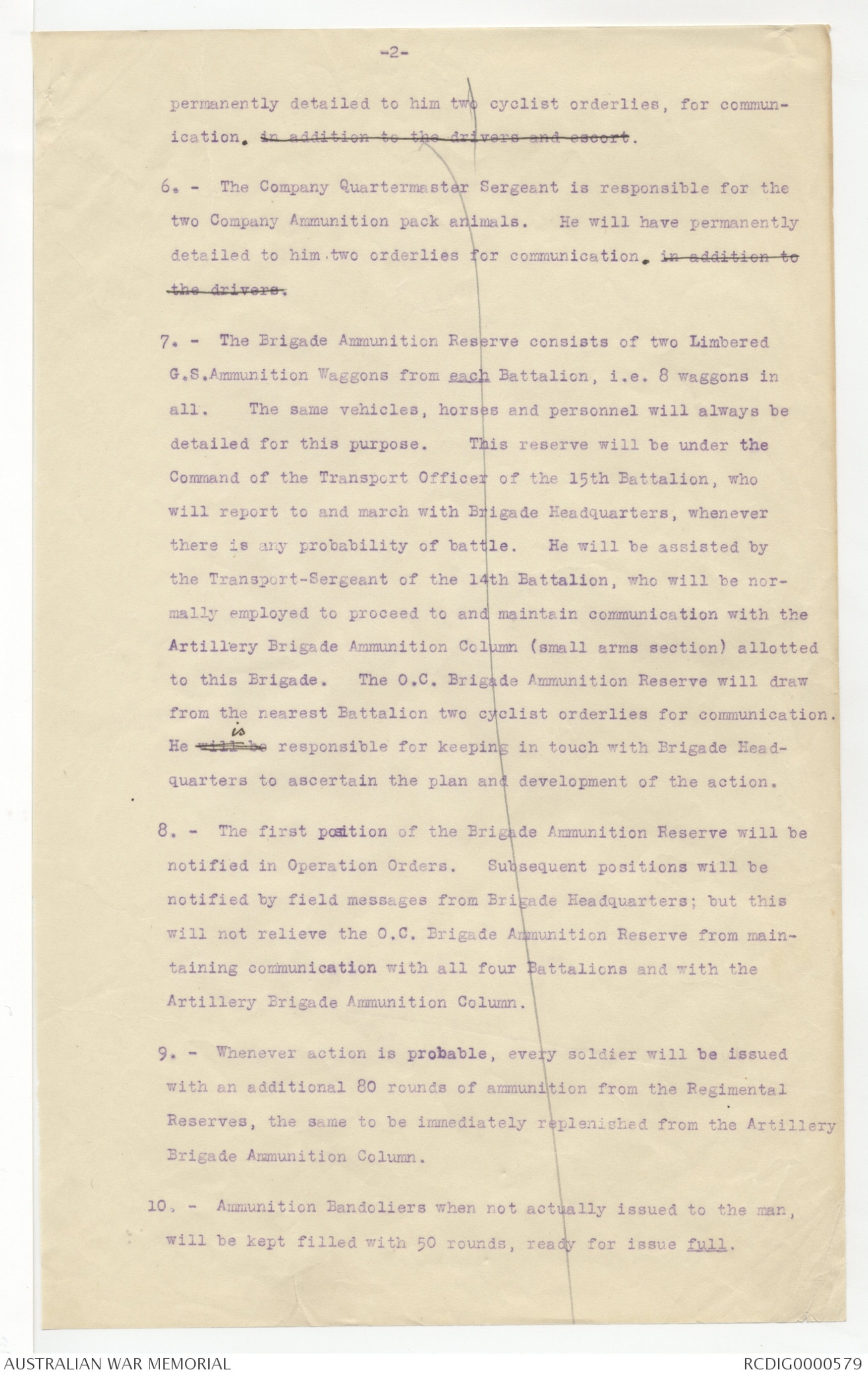
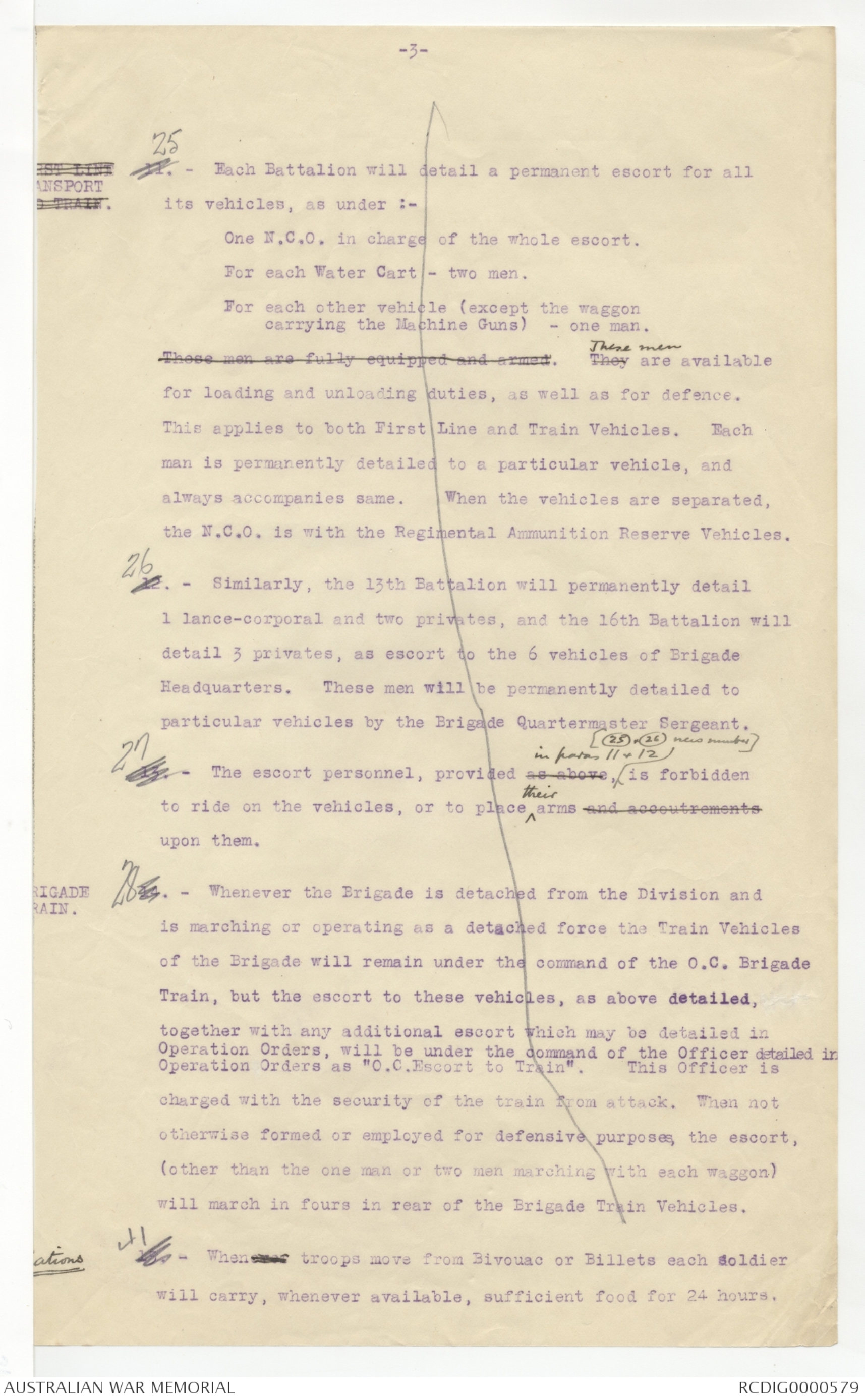
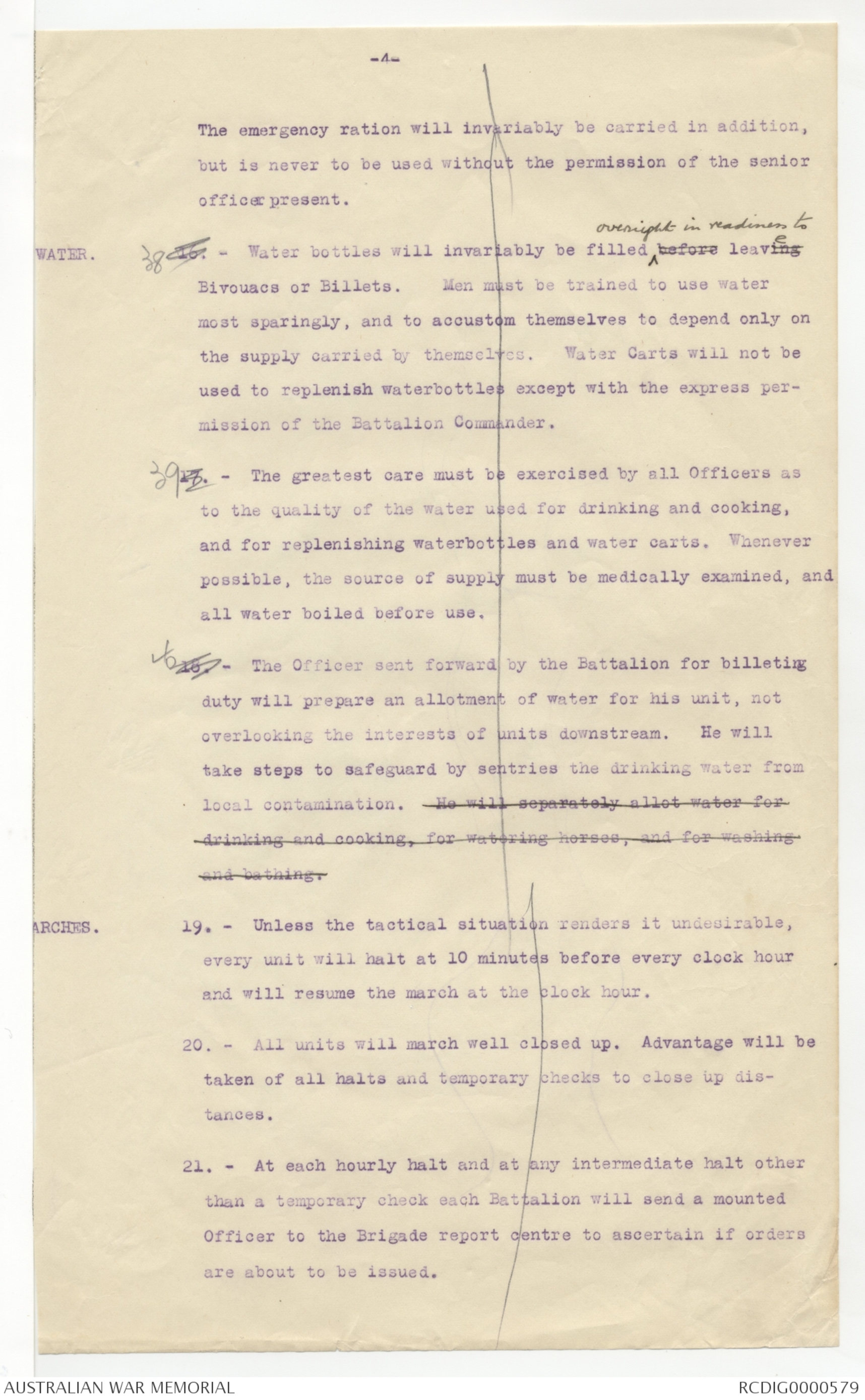
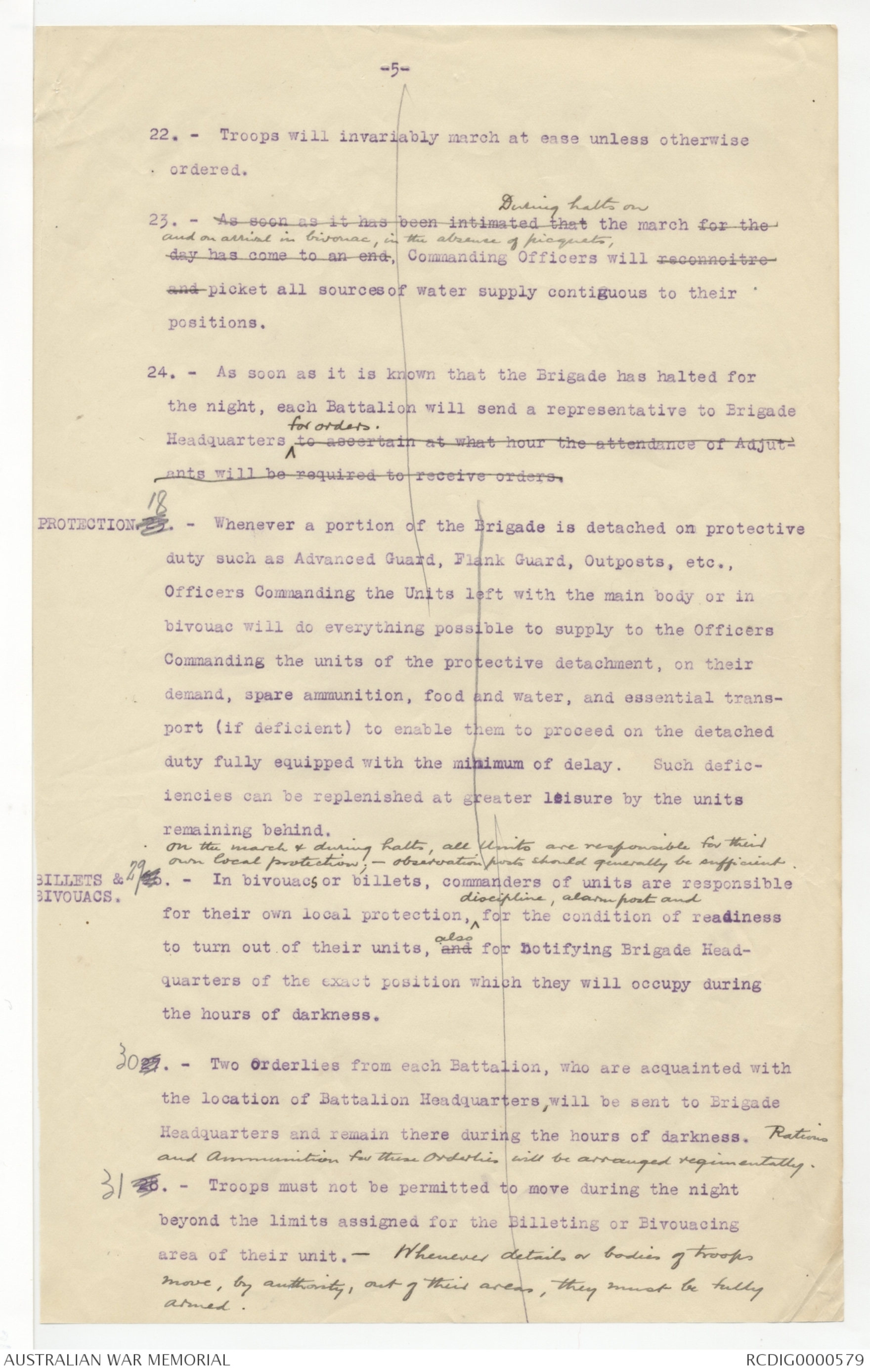
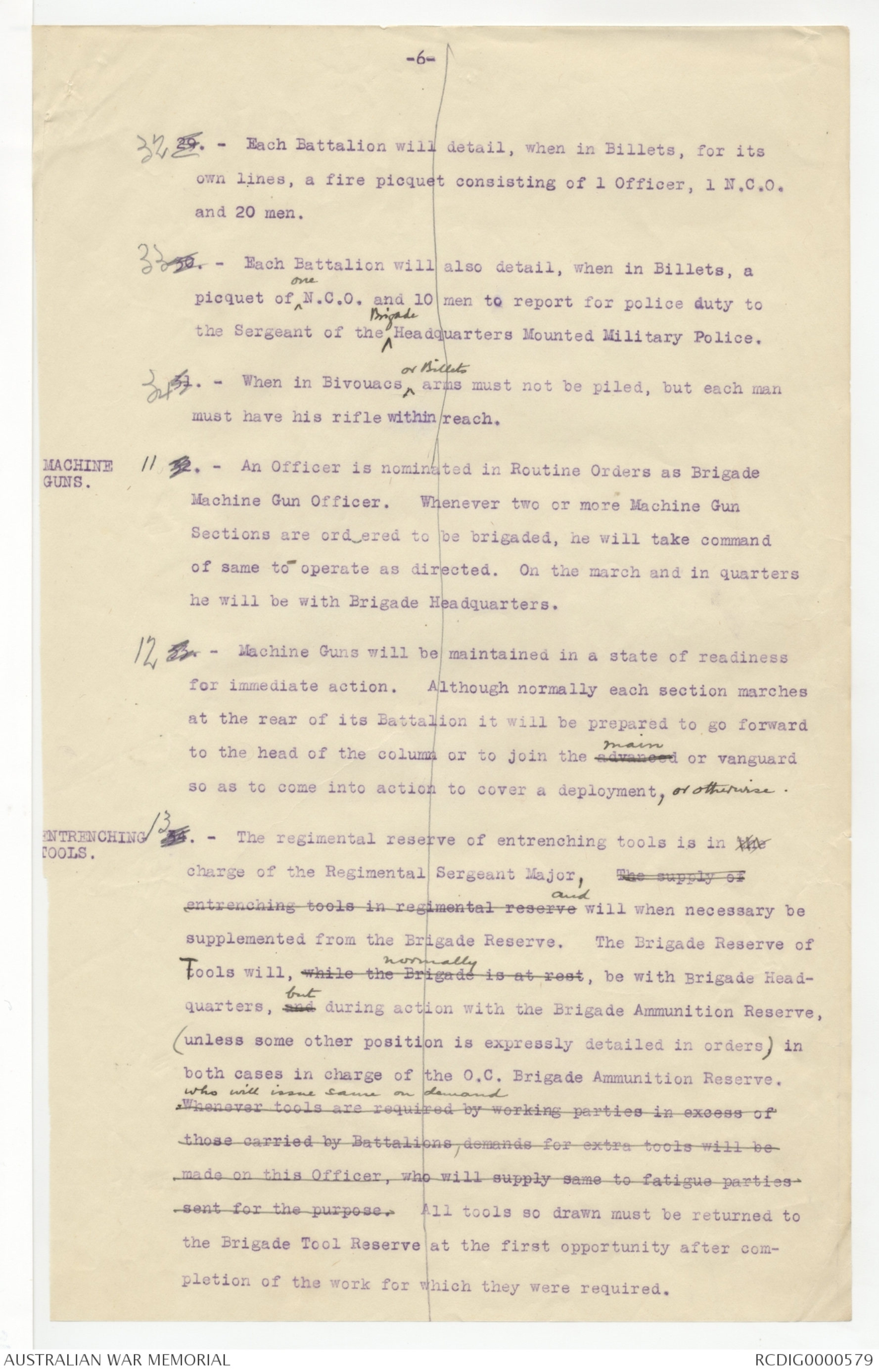
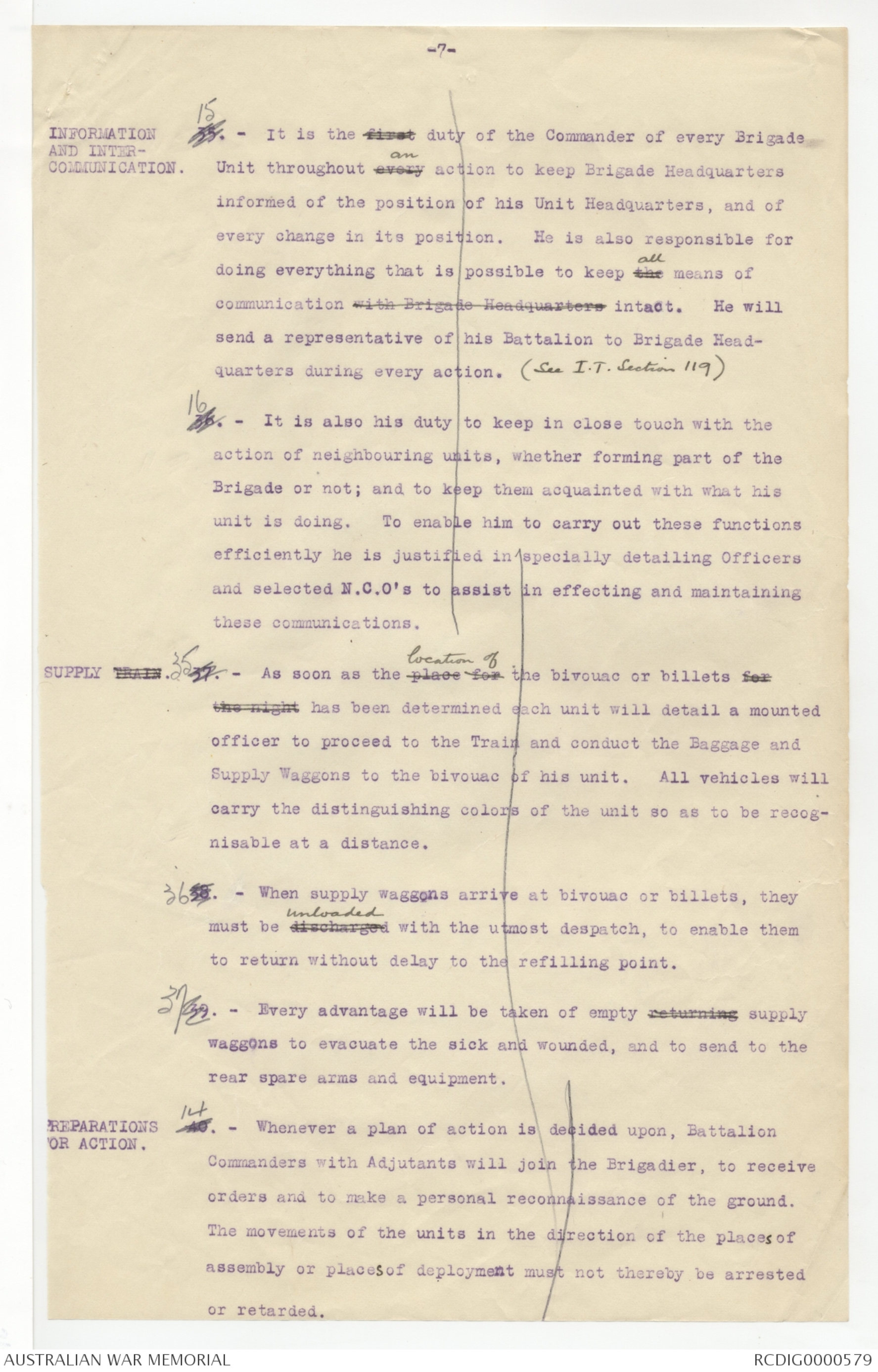
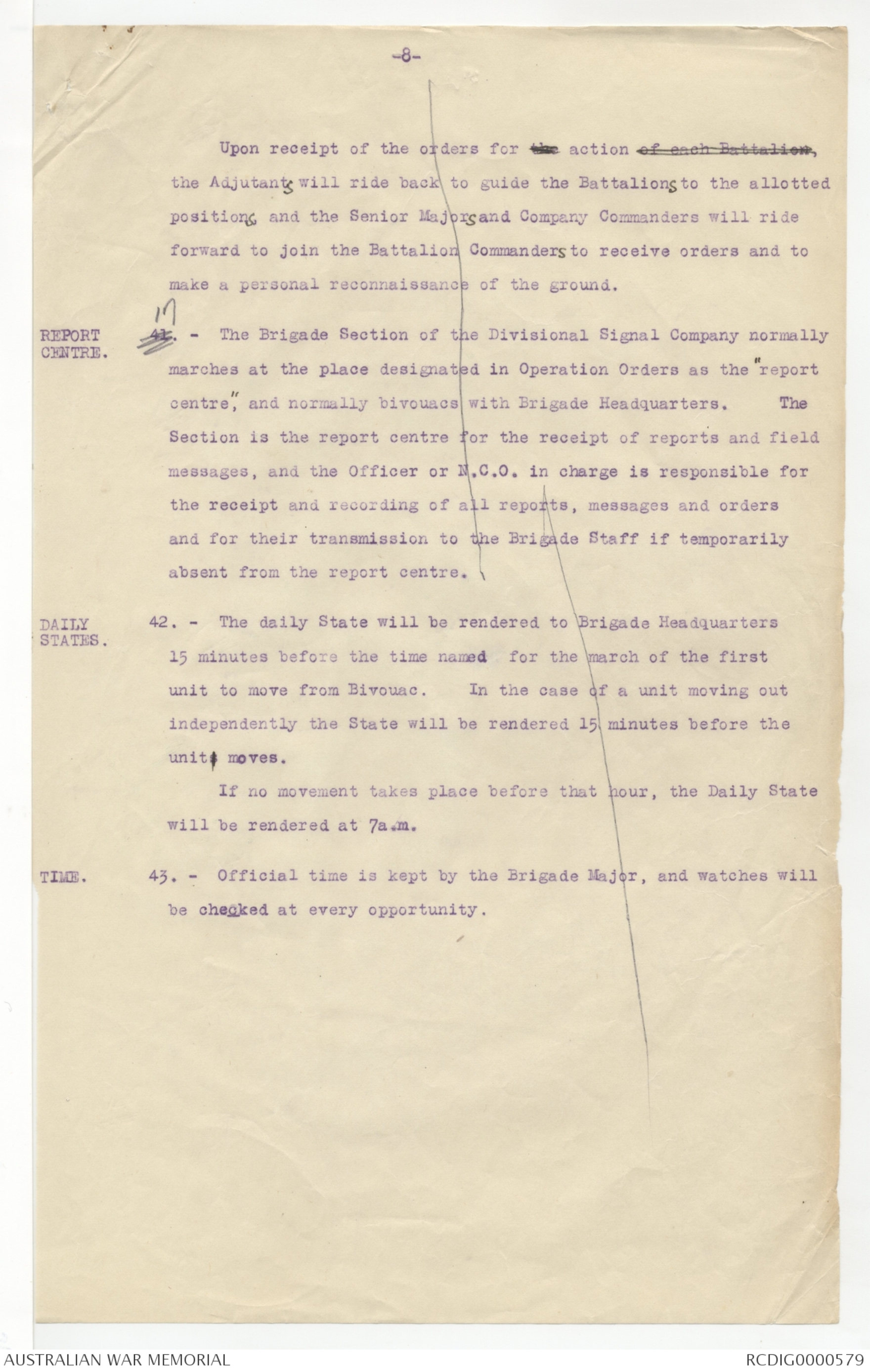
dy
Preparations for
Action
38 40 Whenever a plan of action is decided
upon, Battalion Commanders with Adjutants
will join the Stipendiary, to receive orders &
to make a personal reconnaissance of the
ground. over The movements of the units
in the direction of the place of assembly or
place of deployment must not thereby be
arrested or retarded. _
Upon receipt of the orders for the action
of each Battalion, the Adjutant will ride
back to guide the Battalion to the allotted
position, and the Senior Major and the Company Commanders
will ride forward to join the Battalion
Commander to receive orders & to make
a personal reconnaissance of the ground.
Operation Standing Orders. March 1915
(37)
Amended order of paragraphs.
Ammunition paras 1 to 10 becomes 1-10
Machine Guns " 32 . 33 " 11,12
Entrenching Tools]]. " 34 " 13
Preparation for Action " 40 " 14
Information & inter- " 35 . 36 " 15.16
communication
Report Centre " 41 " 17
Protection " 25 " 18
Marches " 19 to 24 " 19 to 24 First Line Transport. " 11 to 13 " 25 to 27
Brigade Train. " 14 " 28
Supply ↓ " 37 to 39 " xxxxx 35 to 37
Billets & Bivouacs ⇡ " 26 to 31 " xxxxx 29 to 34
Water " 16 to 18 " 38 to 40
Rations " 15 " 41
Daily States " 42 " 42
Time " 43 " 43
NEW ZEALAND AND AUSTRALIAN DIVISION . Brigadier's Copy.
FOURTH (AUSTRALIAN) INFANTRY BRIGADE .
OPERATION STANDING ORDER.
(by Colonel J. Monash V.D.
↓ {set this in a little} [Bgde?]] . 4th.
"Published under paragraph No. 1884, King's Regulations."
A. The following orders are promulgated :-
(a) to save repetitions in Operation
orders
(b) to secure uniformity of action by all Commanders
within the brigade.
B. These orders apply to all Operations of War, except
when expressly varied in Operations Orders, or in special
instructions issued from time to time.
C. Any permanent variations will be promulgated in writing,
and will be entered upon all copies in the possession of
Units.
D. Where anything contained in these orders appears to
conflict with Army Corps or Divisional Standing orders the latter are
to be taken as paramount.
-------------------------------------------------
AMMUNITION. 1. - Small Arms Ammunition, 120 rounds per man, will be
carried by every soldier armed with a rifle. Deficiencies
will be made good at every opportunity from Regimental
Reserves.
2. - For each Machine Gun there will be carried 3500 rounds
with the gun, and 8000 rounds per gun in the G. S.Limbered
Waggon accompanying the machine Gun Section.
3. - In each of the five G. S. Limbered Waggons with the
Battalion there will be carried 8000 rounds, and on each pack
animal 2000 rounds.
4. - These several reserves will be replenished from the
Brigade ammunition Reserve or from the Artillery Brigade
Ammunition Column, as the case may; be, at every opportunity.
5. - The Regimental Sergeant Major is responsible for the
Regimental ammunition Reserve Waggons. He will have
-2-
permanently detailed to him two cyclist orerlies, for commun-
ication. in addition to the drivers and escort.
6. - The Company Quartermaster Sergeant is responsible for the
two Company Ammunition pack animals. He will have permanently
detailed to him two orderlies for communication. in addition to
the drivers.
7. - The Brigade Ammunition Reserve consists of two Limbered
G. S.Ammunition waggons from each Battalion, i.e. 8 waggons in
all. The same vehicles, horses and personnel will always be
detailed for this purpose. This reserve will be under the
Command of the Transport Officer of the 15th battalion, who
will report to and march with Brigade Headquarters, whenever
there is any probability of battle. He will be assisted by
the Transport-Sergeant of the 14th Battalion, who will be nor-
mally employed to proceed to and maintain communication with the
Artillery Brigade Ammunition Column (small arms section) allotted
to this Brigade. The O.C. Brigade Ammunition Reserve will draw
from the nearest battalion two cyclist orderlies for communication.
He will is responsible for keeping in touch with Brigade Head-
quarters to ascertain the plan and development of the action.
8. - The first position of the Brigade Ammunition reserve will be
notified in Operations Orders. Subsequent positions will be
notified by field messages from Brigade Headquarters; but this
will not relieve the O . C . Brigade Ammunition Reserve fro main-
taining communication with all four Battalions and with the
Artillery Brigade Ammunition Column.
9. - Whenever action is probable, every soldier will be issued
with an additional 80 rounds of ammunition from the Regimental
Reserves, the same to be immediately replenished from the Artillery
Brigade Ammunitions Column.
10. - Ammunition Bandoliers when not actually issued to the man,
will be kept filled with 50 rounds, ready for issue full.
-3- ST LINE 11 25. - Each Battalion will detail a permanent escort for all
ANSPORT its vehicles, as under :- O TRAIN One N.C.O. in charge of the whole escort.
For each Water Cart - two men.
For each other vehicle (except the waggon
carrying the Machine Guns) - one man.
These men are fully equipped and armed. They These men are available
for loading and unloading duties, as well as for defence.
This applies to both First Line and Train Vehicles. Each
man is permanently detailed to a particular vehicle, and
always accompanies same. When the vehicles are separated,
the N.C.O. is with the Regimental Ammunition Reserve Vehicles.
1226. - Similarly, the 13th Battalion will permanently detail
1 lance-corporal and two privates, and the 16th Battalion will
detail 3 privates, as escort to the 6 vehicles of Brigade
Headquarters. These men will be permanently detailed to
particular vehicles by the Brigade Quartermaster Sergeant.
13 27. - The escort personnel, provided as above (in para 11 & 12 [25&26
new number]) is forbidden
to ride on the vehicles, or to place (their) arms and accoutrements
upon them.
BRIGADE 14 28. - Whenever the Brigade is detached from the Division and
TRAIN. is marching or operating as a detached force the Train Vehicles
of the Brigade will remain under the command of the O.C. Brigade
Train, but the escort to these vehicles, as above detailed,
together with any additional escort which may be detailed in
Operation Orders, will be under the command of the Officer detailed in
Operation Orders as the "C.O. Escort to Train". This Officer is
charged with the security of the train from attack. When not
otherwise formed or employed for defensive purposes, the escort,
(other than the one man or two men marching with each Waggon)
will march in fours in rear of the Brigade Train Vehicles.
15. 41- When troops move from Bivouac or Billets each soldier
will carry, whenever available, sufficient food for 24 hours.
-4-
The emergency ration will invariably be carried in addition,
but is never to be used without permission of the senior
officer present.
WATER. 38 16. - Water bottles will invariably be filled (overnight in readiness to)
before leaving (e) Bivouac or Billets. Men must be trained to use water
most sparingly, and to accustom themselves to depend only on
the supply carried by themselves. Water Carts will not be
used to replenish waterbottles except with the express per-
mission of the Battalion Commander.
39 17. - The greatest care must be exercised by all Officers as
to the quality of the water used for drinking and cooking,
and for replenishing waterbottles and water carts. Whenever
possible, the source of supply must be medically examined, and
all water bottles before use.
40 18. - The Officersent forward by the Battalion for billeting
duty will prepare an allotment of water for his unit, not
overlooking the interests of units downstream. He will
take steps to safeguard by sentries the drinking water from
local contamination. He will separately allot water for
drinking and cooking, for watering horses, and for washing
and bathing.
ARCHES. 19. - Unless the tactical situation renders it undesirable,
every unit will halt at 10 minutes before every clock hour
and will resume the march at the clock hour.
20. - All units will march well closed up. Advantage will be
taken of all halts and temporary checks to close up distances.
21. - At each hourly halt and at any intermediate halt other
than a temporary check each Battalion will send a mounted
Officer to the Brigade report centre to ascertain if orders
are about to be issued.
-5-
22. - Troops will invariably march at ease unless otherwise
ordered.
23. - As soon as it has been intimated that During halts on the march for the
day has come to an end, and on arrival in bivouac, in the absence of
picquets, Commanding Officers will reconnoitre
and picket all sources of water supply contiguous to their
positions.
24. - As soon as it is known that the Brigade has halted for
the night, each Battalion will send a representative to Brigade
Headquarters for orders. to ascertain at what hour the attendance of
Ajutants will be required to receive orders.
PROTECTION.
25 18. - Whenever a portion of the Brigade is detached on protective
duty such as Advanced Guard, Flank Guard, Outposts, etc.,
Officers Commanding the Units left with the main body or in
bivouac will do everything possible to supply to the Officers
Commanding the units of the protective detachment, on their
demand, spare ammunition, food & water, and essential trans-
port (if deficient) to enable them to proceed on the detached
duty fully equipped with the minimum of delay. Such defic-
iencies can be replenished at greater leisur by the units
remaining behind.
on the march & during halts, all Units are responsible for their
own local protection; - observation posts should generally be sufficient.
BILLETS &
BIVOUACS.
29 26. - In bivouacs or billets, commanders of units are responsible
for their own local protection, discipline, alarm post and for the condition of readiness
to turn out of their units, and also for notifying the Brigade Head-
quarters of the exact position which they will occupy during
the hours of darkness.
30 27. - Two Orderlies from each Battalion, who are aquainted with
the location of Battalion Headquarters, will be sent toBrigade
Headquarters and remain there during the hours of darkness. Rations
and Ammunition for these Orderlies will be arranged regimentally.
31 28. - Troops must not be permitted to move during the night
beyond the limits assigned for the Billeting or Bivouacing
area of their unit. - Whenever details or bodies of troops
move, by authority, out of their areas, they must be fully
armed.
-6-
32 29.- Each Battalion will detail, when in Billets, for its
own lines, a fire picquet consisting of 1 Officer, 1 N.C.O.
and 20 men.
33 30. - Each Battalion will also detail, when in Billets, a
picquet of one N.C.O. and 10 men to report for police duty to
the Sergeant of the Brigade Headquarters Mounted Military Police.
34 31. - When in Bivouac or Billets arms must not be piled, but each man
must have his rifle within reach.
MACHINE
GUNS. 11 32 - An Officer is nominated in Routine Orders as Brigade
Machine Gun Officer. Whenever two or more Machine Gun
Sections are ordered to be brigaded, he will take command
of same to operate as directed. On the march and in quarters
he will be with Brigade Headquarters.
12 33. - Machine Guns will be maintained in a state of readiness
for immediate action. Although normally each section marches
at the rear of its Battalion it will be prepared to go forward
to the head of the column or to join the advanced main or vanguard
so as to come into action to cover a deployment, or otherwise.
ENTRENCHING
TOOLS 13 34.- The regimental reserve of entrenching tools is in the
charge of the Regimental Sergeant Major, the supply of
entrenching tools in regimental reserve and will necessary be
supplemented from the Brigade Reserve. The Brigade Reserve of
Tools will, while the Brigade is at rest, normally be with Brigade Head-
quarters, and but during action with the Brigade Ammunition Reserve,
(unless some other position is expressly detailed in orders ) in
both cases in charge of the O.C. Brigade Ammunition Reserve.
who will issue same on demandWhatever tools are required by working
parties in excess of those carried by Battalions, demands for extra tools
will be made on this Officer, who will supply same to fatigue parties
sent for the purpose. All tools so drawn must be returned to
the Brigade Tool Reserve at the first opportunity after com-
pletion of the work for which they were required.
-7-
INFORMATION
AND INTER-
COMMUNICATION
15 35. - It is the first duty of the Commander of every Brigade
Unit throughout every an action to keep Brigade Headquarters
informed of the position of his Unit Headquarters, and of
every change in its position. He is also responsible for
doing everything that is possible to keep the all means of
communication with Brigade Headquarters intact. He will
send a representative of his Battalion to Brigade Head-
quarters during every action. (See I.T. Section 119)
16 36. - It is also his duty to keep in close touch with the
action of neighbouring units, whether forming part of the
Brigade or not; and to keep them acquainted with what his
unit is doing. To enable him to carry out these functions
efficiently he is justified in specially detailing Officers
and selected N.C.O's to assist in effecting and maintaining
these communications.
SUPPLY35 37. - As soon as the place for location of the bivouac or billets for TRAIN. the night has been determined each unit will detail a mounted
officer to proceed to the Train and conduct the Baggage and
Supply Waggons to the bivouac of his unit. All vehicles will
carry the distinguishing colors of the unit so as to be recog-
nisable at a distance.
36 38. - When supply waggons arrive at bivouac or billets, they
must be discharged unloaded with the utmost despatch, to enable them
to return without delay to the refilling point.
37 39. - Every advantage will be taken of empty returning supply
waggons to evacuate the sick and wounded, and to send to the
rear spare arms and equipment.
PREPARATIONS
FOR ACTION.
14 40. - Whenever a plan of action is decided upon, Battalion
Commanders with Adjutants will join the Brigadier, to receive
orders and make a personal reconnaisance of the ground.
The movements of the units in the direction of the places of
assembly or places of deployment must not thereby be arrested
or retarded.
-8-
Upon receipt of the orders for the action of each Battalion,
the Adjutants will ride back to guide the Battalions to the allotted
positions and the Senior Majors and Company Commanders will ride
forward to join the Battalion Commanders to receive orders and to
make a personal reconnaissance of the ground.
REPORT17 41. - The Brigade Section of the Divisional Signal Company normally
CENTRE. marches at the place designated in the Operation Orders as the "report
centre", and normally bivouacs with the Brigade Headquarters. The
Section is the report centre for the receipt of reports and field
messages, and the Officer or N.C.O. in charge is responsible for
the receipt and recording of all reports, messages and orders
and for their transmission to the Brigade Staff if temporarily
absent from the report centre.
DAILY. 42. - The Daily State will be rendered to the Brigade Headquarters
STATES 15 minutes before the time named for the march of the first
unit to move from Bivouac. In the case of a unit moving out
independently the State will be rendered 15 minutes before the
units moves.
If no movement takes place before that hour, the Daily State
will be rendered at 7a.m.
TIME 43. - Offical time is kept by the Brigade Major, and watches will
be checked at every opportunity.
 Jacqueline Kennedy
Jacqueline KennedyThis transcription item is now locked to you for editing. To release the lock either Save your changes or Cancel.
This lock will be automatically released after 60 minutes of inactivity.